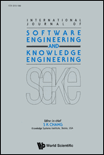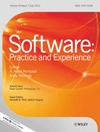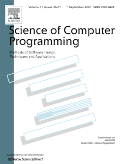
SOFTWARE QUALITY JOURNAL
Scope & Guideline
Fostering innovation in software development.
Introduction
Aims and Scopes
- Software Quality Assurance and Testing:
The journal extensively covers methodologies for ensuring software quality, including automated testing, test case generation, and verification processes. - Defect Prediction and Management:
Research on predicting software defects, managing technical debt, and analyzing code quality is a core focus, emphasizing machine learning and statistical approaches. - Software Development Methodologies:
The journal explores various software development paradigms, including Agile and DevOps, particularly how these methodologies impact software quality and team dynamics. - Emerging Technologies in Software Engineering:
A significant emphasis is placed on how emerging technologies, such as AI, machine learning, and quantum computing, influence software quality and testing practices. - User Experience and Usability:
The journal addresses the importance of user experience in software design and its correlation with software quality, especially in agile environments. - Formal Methods and Verification Techniques:
It includes research on formal verification methods, ensuring that software adheres to specified quality standards and regulations.
Trending and Emerging
- Gamification in Software Development:
There is a growing trend towards utilizing gamification techniques in software development processes, aimed at enhancing developer engagement and productivity. - Machine Learning for Quality Improvement:
Machine learning applications for defect prediction, bug localization, and automated testing are increasingly dominant, showcasing the integration of AI in software quality assurance. - Quality in Agile and DevOps Frameworks:
Research focusing on quality assurance practices within Agile and DevOps contexts is on the rise, reflecting industry shifts towards these methodologies and their impact on software quality. - Cybersecurity and Quality Assurance:
With the increasing importance of cybersecurity, there is a trend towards integrating security considerations into quality assurance processes, particularly in the context of software development lifecycles. - Quality Metrics and Data-Driven Approaches:
The use of comprehensive quality metrics and data-driven methodologies for assessing and improving software quality is gaining traction, emphasizing empirical validation of quality practices. - Exploration of User Experience (UX) Debt:
Emerging research on UX debt highlights the importance of user experience in software quality, indicating a trend towards addressing not just functional but also experiential quality in software products.
Declining or Waning
- Traditional Static Code Analysis:
While once a primary focus, traditional static code analysis methods are now less prevalent, possibly due to the rise of dynamic analysis and machine learning techniques that offer more robust solutions. - Manual Testing Approaches:
There is a noticeable decrease in papers discussing manual testing methods, as the industry increasingly adopts automation and AI-driven testing strategies. - Legacy Software Quality Issues:
Research specifically targeting legacy systems and their quality challenges has diminished, likely overshadowed by the emphasis on modern software architectures such as microservices. - Single-Metric Quality Models:
The journal has moved away from studies that focus solely on single-metric models for assessing software quality, shifting towards more holistic, multi-dimensional quality assessment frameworks.
Similar Journals

International Journal on Software Tools for Technology Transfer
Exploring Cutting-Edge Tools for Effective Technology TransferInternational Journal on Software Tools for Technology Transfer (ISSN: 1433-2779; E-ISSN: 1433-2787), published by SPRINGER HEIDELBERG, stands as a pivotal platform for advancing the intersection of software engineering and technology transfer. Operating out of Germany, this esteemed journal has contributed significantly to the field since its inception in 1997 and continues to disseminate cutting-edge research through 2024. With a current impact footprint reflected in its Q2 status in Information Systems and Q3 in Software categories, it holds an impressive Scopus rank in the top 60th and 52nd percentiles respectively. Researchers, professionals, and students alike will find its commitment to exploring innovative software tools and techniques essential for enhancing technology transfer processes invaluable. Although the journal does not offer open access, its rigorously peer-reviewed articles are crucial for those seeking high-quality research insights.

Software Impacts
Connecting Researchers and Practitioners in Software ScienceSoftware Impacts is an esteemed academic journal published by ELSEVIER, dedicated to advancing the field of software science and informing best practices in development and application. With an ISSN of 2665-9638, this journal facilitates the dissemination of impactful research from 2019 to 2024, making it a valuable resource for both established researchers and promising students alike. Although it currently holds a Q3 ranking in the category of Software and ranks at #270/407 in Scopus, it continues to contribute significantly to the discourse surrounding software-related innovations and methodologies. The journal’s open access policy enhances accessibility and encourages a broader readership, fostering an environment where critical discussions flourish. By addressing the ongoing challenges and advancements in software technology, Software Impacts plays a crucial role in shaping the future of software development and its applications globally.

Proceedings of the ACM on Programming Languages-PACMPL
Transforming the Landscape of Programming Language Research.Proceedings of the ACM on Programming Languages (PACMPL) is a premier journal that focuses on the advancement and dissemination of knowledge in the field of programming languages. Published by the Association for Computing Machinery (ACM), this rigorous journal serves as a vital platform for researchers, professionals, and students alike, contributing significantly to software development and safety across diverse applications. With impressive rankings in Q1 quartiles for both Safety, Risk, Reliability and Quality and Software, and a recognition in the Scopus Rankings, PACMPL stands out as a critical resource for cutting-edge research. The journal is particularly relevant in today’s rapidly evolving technological landscape, focusing on innovative practices and methodologies in programming languages that enhance system reliability and performance. As an Open Access publication since its convergence in 2017, PACMPL not only emphasizes high-quality peer-reviewed research but also prioritizes accessibility, making significant contributions to the global knowledge base. By empowering researchers and practitioners with the latest findings and trends, PACMPL continues to firmly establish its importance in the computing field.

PROGRAMMING AND COMPUTER SOFTWARE
Innovating Programming Methodologies for Tomorrow's ChallengesPROGRAMMING AND COMPUTER SOFTWARE is a distinguished journal committed to advancing the field of software development and programming methodologies. Published by PLEIADES PUBLISHING INC, this journal has been a valuable resource since its inception in 1978, reaching out to researchers, professionals, and students alike. With an emphasis on rigorous peer-reviewed articles, the journal holds a Q3 ranking in the realm of Software according to the latest 2023 Category Quartiles. Though it does not offer open access, the journal ensures that high-quality research is disseminated to its audience, providing insights into evolving programming techniques, software engineering challenges, and innovative solutions. With its convergence of years extending to 2024, PROGRAMMING AND COMPUTER SOFTWARE remains a pivotal publication, fostering a deeper understanding of the complexities in computer programming while supporting the broader software community.

INTERNATIONAL JOURNAL OF SOFTWARE ENGINEERING AND KNOWLEDGE ENGINEERING
Unveiling the Future of Software Engineering and KnowledgeThe INTERNATIONAL JOURNAL OF SOFTWARE ENGINEERING AND KNOWLEDGE ENGINEERING, published by WORLD SCIENTIFIC PUBL CO PTE LTD in Singapore, is a pivotal platform for disseminating cutting-edge research in the fields of software engineering and knowledge systems. With an ISSN of 0218-1940 and an E-ISSN of 1793-6403, this journal has been a reliable resource for scholars and practitioners since its inception in 1996. The journal is indexed across multiple prestigious databases, reflecting its relevance with a Category Quartile ranking of Q3 in both Computer Graphics and Computer Networks for 2023, and it maintains a steady trajectory of growth and scholarly contribution. Although not an Open Access journal, it is accessible through various academic institutions and libraries, ensuring researchers can engage with high-quality, peer-reviewed articles that explore advancements, theoretical developments, and practical applications in software and knowledge engineering. As it converges towards its end year of 2024, this journal continues to foster innovation and knowledge exchange, making it an essential resource for anyone invested in these dynamic fields.

SOFTWARE-PRACTICE & EXPERIENCE
Fostering innovation in software practices for a dynamic future.SOFTWARE-PRACTICE & EXPERIENCE, published by Wiley, is a prestigious journal that has significantly contributed to the field of software engineering since its inception in 1971. With a Q2 ranking in Software according to the 2023 category quartiles, it stands among the top tier of journals, positioned in the 79th percentile within Scopus’s Computer Science _ Software category. The journal focuses on disseminating high-quality research that reflects both academic rigour and practical application in software-related practices, ensuring that it remains relevant for researchers, professionals, and students alike. Although it does not currently offer Open Access options, it continues to provide invaluable insights and thorough explorations of contemporary issues in software development, methodology, and experience. As it converges toward 2024, SOFTWARE-PRACTICE & EXPERIENCE aims to foster a greater understanding of effective software practices in a rapidly evolving technological landscape.

Journal of Object Technology
Empowering Research in Object Technology and Software DevelopmentJournal of Object Technology is a premier publication housed under the esteemed JOURNAL OBJECT TECHNOLOGY in Switzerland, dedicated to advancing the field of software engineering and technology. With a history of continuous publication since 2002, this journal serves as a platform for innovative research, critical reviews, and case studies that explore the nuances of object-oriented technologies and their applications in software development. Although currently categorized in the lower quartile (Q4), this journal's focus on relevant and emerging topics remains vital for researchers, professionals, and students alike, seeking to enhance their understanding of contemporary software-related issues. Addressing significant milestones and offering insights into future directions, the Journal of Object Technology plays an essential role in the evolving landscape of computer science, providing open access opportunities that ensure wide dissemination of knowledge. Situated at ETH Zurich, the journal is committed to fostering collaboration and dialogue among researchers worldwide, underscoring its importance within the global scholarly community.

Innovations in Systems and Software Engineering
Unveiling the Next Generation of Systems EngineeringInnovations in Systems and Software Engineering, published by Springer London Ltd, is a highly relevant journal dedicated to advancing the field of software engineering and systems innovation. With an ISSN of 1614-5046 and E-ISSN 1614-5054, this journal serves as a key platform for researchers and practitioners to share their insights, cutting-edge research, and developments from 2005 to 2024. Positioned in the Q3 category for software within the 2023 metrics and ranked #219 out of 407 in Scopus, the journal highlights its commitment to addressing the evolving challenges and opportunities in software systems. Although not open access, it maintains a rigorous peer-review process to ensure the dissemination of quality research. As the field continues to grow in complexity, Innovations in Systems and Software Engineering is vital for fostering collaboration and innovation among professionals, students, and researchers aiming to shape the future of software engineering.

Journal of Communications Software and Systems
Connecting Theory with Practice in Communications TechnologyThe Journal of Communications Software and Systems, with ISSN 1845-6421 and E-ISSN 1846-6079, is a prominent platform for scholars and practitioners in the field of communications and software engineering, published by the esteemed Croatian Communications & Information Society. Since its establishment in 2006, this Open Access journal, based in Croatia, has committed to disseminating cutting-edge research and innovative solutions that bridge gaps between theory and practical application in the rapidly evolving domain of electrical and electronic engineering. With an impact factor that reflects its relevance, the journal holds significant rankings in both Electrical and Electronic Engineering (Q3) and Software (Q4) categories, according to the 2023 metrics, highlighting its essential role in advancing knowledge in these critical areas. The journal not only serves as a repository of knowledge but also encourages collaborations and discussions among researchers, professionals, and students alike, making it an indispensable resource for anyone looking to stay abreast of the latest developments and research trends from 2006 to 2024 and beyond.

SCIENCE OF COMPUTER PROGRAMMING
Unveiling the Science Behind Software InnovationScience of Computer Programming, published by Elsevier, is a leading journal dedicated to advancing knowledge in the fields of computer programming, computational theory, and software development. With a focus on interdisciplinary research that spans computational methodologies, information systems, and simulation modeling, this journal plays a vital role in disseminating innovative findings and fostering collaboration among experts in these dynamic areas. With a respectable impact factor and ranked in various Scopus Categories such as computational theory (Q3) and information systems (Q2), it provides a platform for high-quality scholarly articles that push the boundaries of programming science. Although currently not open access, the journal offers invaluable insights for researchers, professionals, and students alike, ensuring they are equipped with the latest advancements and methodologies to thrive in an ever-evolving technological landscape. The journal covers research from its convergence starting in 1981 and continues to welcome groundbreaking contributions as it looks forward to an exciting future through 2025 and beyond.